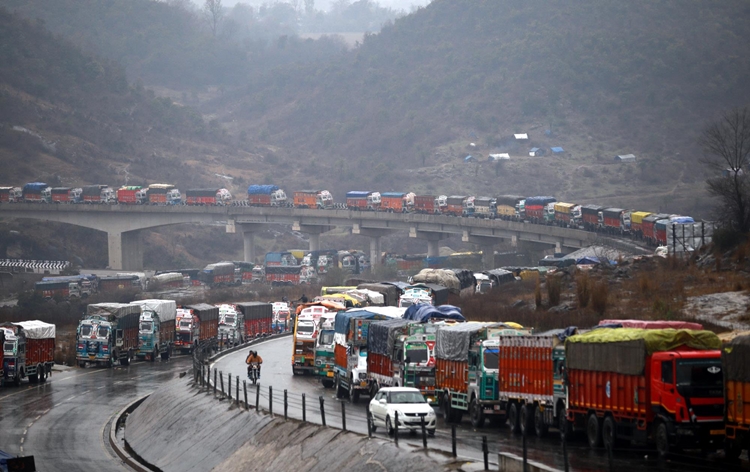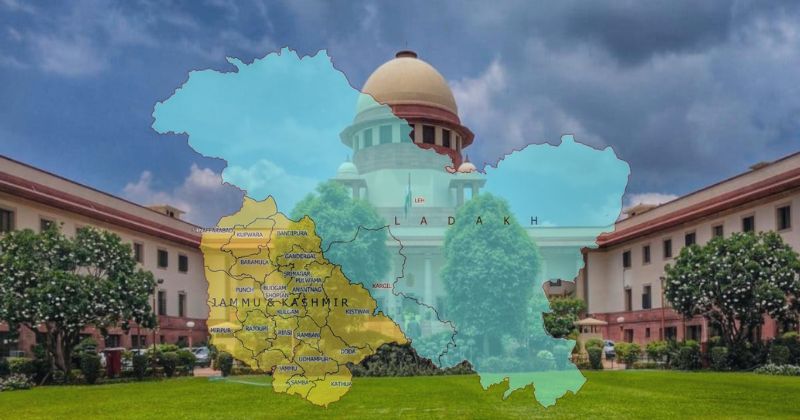When a Road Shuts, a Valley Stops Breathing
By: Javid Amin | 09 September 2025
In Kashmir, roads are not just about movement. They are about survival, culture, tradition, and dignity. When the Jammu–Srinagar National Highway (NH-44) shuts down, the Valley doesn’t just lose connectivity—it loses access to its lifelines.
September 2025 has once again laid bare this truth. The prolonged closure of NH-44, caused by landslides, subsidence, and torrential rains, has sparked two parallel crises that cut to the bone of Kashmiri life:
-
A mutton shortage that has forced more than 150 weddings to be postponed, shattering families’ plans, budgets, and dreams.
-
A fruit crisis, with ₹400 crore worth of apples, pears, and plums rotting in stranded trucks, crippling the Valley’s most important economic sector.
Together, these twin disasters reveal a harsh reality: when one fragile road shuts, an entire society comes to a halt—economically, culturally, and emotionally.
NH-44: Kashmir’s Fragile Lifeline
The Jammu–Srinagar National Highway is often called the “lifeline of Kashmir.” But it is a lifeline built on fragility.
-
Dependence: Nearly 95% of Kashmir’s perishable supplies—food, livestock, fruits, medicines—move along this road.
-
Alternate routes: Mughal Road and Srinagar–Leh highway exist on paper, but their poor condition and frequent closures make them unreliable.
-
Recurring blockades: Landslides, rains, and shooting stones frequently turn the highway into a choke point.
Every time NH-44 closes, it doesn’t just block traffic—it blocks livelihoods, traditions, and identities.
The Mutton Crisis: Weddings on Hold, Traditions Broken
Mutton in Kashmir is not just a food item. It is the centerpiece of Wazwan, the ceremonial feast that defines Kashmiri weddings and festivals. Without mutton, a Kashmiri wedding feels incomplete, almost unthinkable.
The Shortage
With hundreds of livestock trucks stranded on the highway, the Valley has faced an acute shortage of mutton.
-
Over 400 sheep died inside stranded trucks due to starvation and suffocation.
-
The Mutton Dealers Association reported financial losses running into crores with no government compensation.
-
Local butchers shut shops or sold limited supplies at soaring rates.
Weddings Postponed
For Kashmiris, a wedding is a once-in-a-lifetime event. But this season, the highway closure turned joy into heartbreak.
-
150+ weddings had to be postponed.
-
Families faced embarrassment and social pressure, as guests and venues had already been booked.
-
Caterers, decorators, and event planners lost significant business.
A father from Anantnag said:
“We had the venue, the guests, the decorations ready. But without mutton, we had no choice but to cancel. It was humiliating.”
More Than an Economic Loss
The deaths of sheep inside trucks added an ethical dimension. These weren’t just economic losses but also a failure of empathy and governance.
The Fruit Crisis: Kashmir’s Economic Backbone Bleeding
While the mutton crisis dominated headlines, the fruit industry—the backbone of Kashmir’s economy—was quietly collapsing.
Trucks Stranded, Apples Rotting
-
Over 250 trucks carrying apples, pears, and plums were stranded between Lakhanpur and Qazigund.
-
Fruit meant to reach Delhi in 48 hours sat in trucks for 6–8 days, exposed to heat and humidity.
-
Cold storage units in the Valley overflowed, leaving no space for emergency storage.
A Sopore fruit trader explained:
“We’ve lost ₹200 crore in just one week. Apples that should sell at ₹1,200 a box are being dumped at ₹300. By the time they reach Delhi, half of them are rotten.”
Losses Mounting
Within two weeks, the Valley’s fruit industry suffered ₹400 crore in losses.
-
Apples: ₹280 crore
-
Pears & plums: ₹60 crore
-
Walnuts & apricots: ₹40 crore
-
Logistics & transport losses: ₹20 crore
A Lifeline Industry in Peril
-
Kashmir’s horticulture contributes ₹10,000–12,000 crore annually.
-
Employs nearly 35 lakh people.
-
Apples alone account for 65% of horticultural output.
When this sector collapses, the Valley’s economy collapses with it.
Cultural Fallout: When Food Meets Identity
These crises go beyond numbers—they cut to the cultural fabric of Kashmir.
-
Weddings without mutton feel incomplete, socially embarrassing, and emotionally devastating.
-
Apples rotting not only ruin growers’ incomes but also tarnish Kashmir’s reputation as the “Apple Bowl of India.”
In Kashmir, food is more than survival. It is tradition, pride, and identity. The highway blockade has attacked all three.
Economic Fallout: Counting the Crores
When we add the two crises together, the picture is staggering:
-
Fruit industry losses: ₹400 crore
-
Mutton industry losses: ₹50–75 crore (livestock deaths, dealer losses, postponed weddings)
-
Hospitality/event sector: ₹100 crore (venues, caterers, planners, decorators)
-
Transport sector losses: Uncounted, but significant due to stranded trucks and fuel wastage.
The combined blow crosses ₹500 crore in just two weeks—an unsustainable shock for a region already struggling with unemployment and fragile infrastructure.
Voices from the Valley
-
A Grower from Shopian:
“I’ve borrowed lakhs to buy fertilizers. Now my apples are rotting. The bank won’t care about landslides.”
-
A Mutton Dealer from Poonch:
“My truck was stuck for four days. I lost 40 sheep. Who will pay for this?”
-
A Caterer from Srinagar:
“This is not about money. It is about dignity. When a family cancels a wedding, it is a social wound.”
These voices reflect not just frustration, but a sense of abandonment.
Government Response: Too Little, Too Late
Authorities have made announcements:
-
Escort vehicles for trucks.
-
Mughal Road diversions.
-
Statements on essential supply prioritization.
But ground reality tells another story:
-
Trucks remain stranded.
-
No compensation has been offered to growers or dealers.
-
No emergency wedding relief packages exist.
Even political leaders like Dr. Farooq Abdullah have criticized airlines, truck management, and overall governance, calling it “exploitation of the people.”
Editorial Takeaway: A Systemic Breakdown
This crisis is not an accident. It is a system failure.
-
Overdependence on one fragile highway.
-
No contingency plan for perishable goods.
-
Cold chain gaps that leave fruit to rot.
-
No protocols for livestock transport welfare.
-
Cultural insensitivity toward traditions like Wazwan.
The Valley has been left to suffer—again.
What Needs to Change: A Reformist Roadmap
-
Infrastructure Resilience
-
Upgrade NH-44 into a true all-weather highway.
-
Invest in Mughal Road and alternate cargo corridors.
-
Build a Srinagar–Jammu rail freight line.
-
-
Cold Chain & Logistics
-
Create modern cold storage hubs in Sopore, Shopian, Baramulla.
-
Subsidize refrigerated trucks for fruits.
-
-
Livestock Welfare
-
Dedicated livestock lanes.
-
Mandatory food & water at holding areas.
-
Insurance for livestock deaths in transit.
-
-
Policy & Relief
-
Compensation schemes for perishable goods.
-
Emergency cultural relief for weddings disrupted.
-
-
Cultural Sensitivity
-
Recognize mutton and apples as symbols of Kashmiri identity, not just commodities.
-
The Bigger Picture: Kashmir’s Dependence = Kashmir’s Weakness
Compared to Himachal Pradesh, Turkey, or Poland—where fruit industries thrive on multiple routes, cold chains, and processing units—Kashmir looks unprepared.
Until alternatives exist, every landslide on NH-44 will trigger multi-crore disasters, postponed weddings, and social wounds.
FAQs: For Families, Farmers & Businesses
Q: Will apple prices rise in Delhi, Mumbai?
Yes. Good-quality fruit will become expensive due to supply shortages.
Q: Can postponed weddings be rescheduled soon?
Yes, but many families are facing financial and social strain.
Q: Will growers get compensation?
No announcement yet, though trade bodies demand it.
Q: Could this happen again next year?
Without systemic reforms, absolutely.
Bottom-Line: More Than Meat & Fruit — Kashmir’s Soul at Stake
The highway closure crisis of 2025 is more than about mutton or apples. It is about Kashmir’s dependence on one fragile artery, about traditions postponed, about dreams rotting inside trucks.
When 150 weddings are canceled and ₹400 crore in apples are lost, Kashmir doesn’t just lose money. It loses dignity, culture, and trust.
Until the Valley gets the infrastructure, planning, and respect it deserves, every storm will bring not just rain, but ruin.



